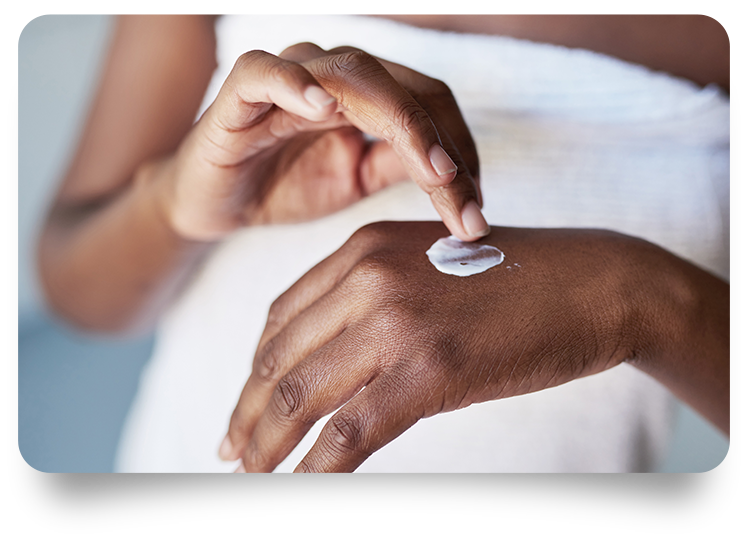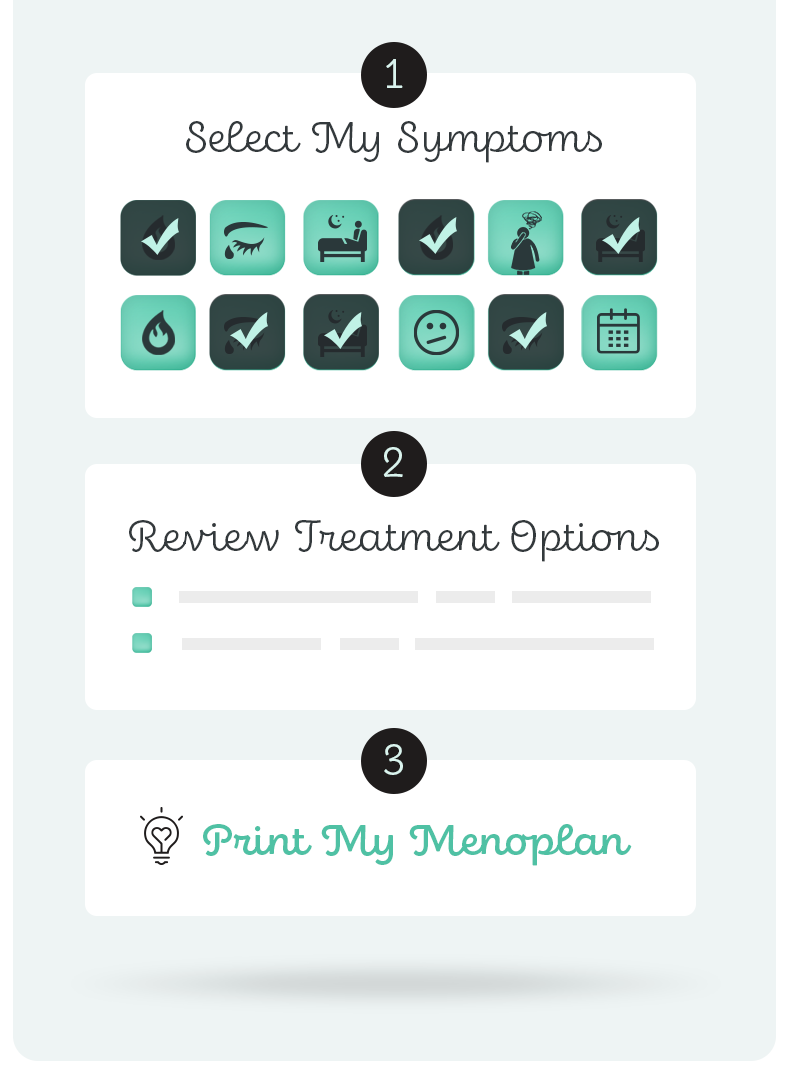Treatments
WHEN TO SEE A DERMATOLOGIST
For skin issues:
- If you have problematic bruising – a dermatologist may suggest retinol or laser treatment.
- Before trying an over-the-counter product for age spots – a dermatologist can make sure it’s not cancer and let you know the right product for you.
- For skin cancer screening.
- Before trying exfoliation or microdermabrasion because these techniques can damage thin skin.
- If you cannot get your acne under control.
- If you have rashes. At about age 50 skin pH level changes, and our skin becomes more sensitive.
For hair issues:
- For advice about removing unwanted facial hair, including laser hair removal.
- In the early stages of thinning hair, such as a widening part or receding hairline. There may be lots of reasons for hair loss, and the treatment should be matched to the cause. Treatments are more effective when begun early.
- Most women do not have deficits of vitamins and minerals. But, talk to your doctor if you think your hair loss may be related to getting either too much of a vitamin/mineral, or too little. Research suggests a relationship between deficiencies in some vitamins and minerals and hair loss (e.g. vitamin A, B2, biotin, C, D, iron, and Zinc). Excess amounts of some vitamins and minerals can also cause hair loss (e.g. selenium, riboflavin, vitamin A). Like Goldilocks, you need just the right amount.
COPING WITH DRY, THINNING HAIR
- Try a hair loss shampoo, which either holds moisture (making your hair look thicker) or lessens breakage. Hair loss shampoos do not prevent further hair loss or regrow hair.
- Don’t begin using over-the-counter products that contain minoxidil without seeing a dermatologist. There are many reasons for hair loss, some serious, and this may not be the right choice for you. Know that the effects go away once you stop using it.
- The jury is out on whether any supplements work. The ones that have been studied are biotin, folic acid, and a combination of omega-3 fatty acids, omega-6 fatty acids and antioxidants. More research is needed to know whether any of these really work.
COPING WITH DRY SKIN
The American Academy of Dermatologists recommends:
- Select a mild soap, without a deodorant, alcohol, or fragrances.
- Use a moisturizer with hyaluronic acid or glycerin for dry skin, and with retinol or peptides to increase collagen in your skin and reduce wrinkles. If your skin is sensitive, irritated, or you have a rash, use a moisturizer without fragrances. And, more expensive doesn’t mean better.
- After bathing, apply a moisturizer. Ointments and creams work better than lotions.
- Keep baths and showers short and water temperatures moderate. Those long hot showers and baths are very drying. Pat, don’t rub, your skin dry.
- For your hands,
- Use waterproof gloves to protect your hand from long immersion in water.
- Use hand cream each time you wash your hands.
- If the air is dry, consider using a humidifier.
- Stick to soft fabrics that breathe, like 100% cotton. Wear something soft like cotton under rough fabrics.
- Wear sunscreen with SPF 30 or higher, or cover up with hat and clothing, even in winter. By protecting your skin from the sun, you may reduce age spots, prevent skin cancer, and prevent further thinning of your skin.
COPING WITH ACNE
- Wash with a cleanser that has salicylic acid to help unclog pores.
- Avoid products that dry your skin, because they can make the acne worse.
OUR BOTTOM LINE: DOES IT HELP?
YES. The pointers here may help you slow down the visible effects of menopause and aging on your hair and skin. Alas, they will not stop it or turn back the clock by a decade. Science has not yet found the fountain of youthful appearance.

DRY HAIR AND SKIN
POTENTIAL RISKS & SIDE EFFECTS
The recommendations are not risky.
IF I WANT TO TRY ONE OF THE SUGGESTIONS, WHAT ARE MY NEXT STEPS?
Look over the lists, see what may work for you, and give it a try. Give skin products at least a few weeks to see a difference. Changes to your hair take months to be noticeable, because of the life-cycle of hairs. Know when to see a dermatologist, too, to avoid worse problems with your skin and hair.
Almohanna HM, Ahmed AA,Tsatalis JP, Tosti A. The Role of Vitamins and Minerals in Hair Loss: A Review. Dermatol Ther (Heidelb). 2019 Mar; 9(1): 51–70. Published online 2018 Dec 13. doi: 10.1007/s13555-018-0278-6
American Academy of Dermatology. https://www.aad.org/public/everyday-care/skin-care-basics/dry/dry-skin-relief Accessed September 28, 2020.
Calleja-Agius J, Brincat M, Borg M. Skin connective tissue and ageing. Best Pract Res Clin Obstet Gynaecol. 2013 Oct;27(5):727-40. doi: 10.1016/j.bpobgyn.2013.06.004. Epub 2013 Jul 10. PMID: 23850161.
Desai K, Almeida B, Miteva M. Understanding Hormonal Therapies: Overview for the Dermatologist Focused on Hair. Dermatology. 2021 Jan 19:1-6. doi: 10.1159/000512888. Epub ahead of print. PMID: 33465769.
Dunn LB, Damesyn M, Moore AA, Reuben DB, Greendale GA. Does Estrogen Prevent Skin Aging? Results From the First National Health and Nutrition Examination Survey (NHANES I). Arch Dermatol. 1997;133(3):339–342. doi:10.1001/archderm.1997.03890390077010
Gasser S., Heidemeyer K., von Wolff M., & Stute P. (2021) Impact of progesterone on skin and hair in menopause – a comprehensive review, Climacteric, DOI: 10.1080/13697137.2020.1838476
Michalak M, Pierzak M, Kręcisz B, Suliga E. Bioactive Compounds for Skin Health: A Review. Nutrients. 2021;13(1):203. Published 2021 Jan 12. doi:10.3390/nu13010203
Phillips TJ, Symons J, Menon S; HT Study Group. Does hormone therapy improve age-related skin changes in postmenopausal women? A randomized, double-blind, double-dummy, placebo-controlled multicenter study assessing the effects of norethindrone acetate and ethinyl estradiol in the improvement of mild to moderate age-related skin changes in postmenopausal women. J Am Acad Dermatol. 2008 Sep;59(3):397-404.e3. doi: 10.1016/j.jaad.2008.05.009. Epub 2008 Jul 14. PMID: 18625536.
Pullar JM, Carr AC, Vissers MCM. The Roles of Vitamin C in Skin Health. Nutrients. 2017;9(8):866. Published 2017 Aug 12. doi:10.3390/nu9080866
Authors: Dr. Leslie Snyder & Dr. Katherine Newton. Last reviewed April 24, 2021



